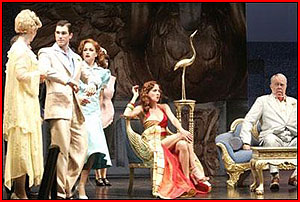
|
|||
|
|||
| Home |
| Gallery |
| Culture/ Technology |
| Fiction |
| Music |
| Poetry |
| Theater |
| What's New |
| About/Contact |
| Archive |
|
An inkling of a comedic hit With a nip here and a tuck there, 'Palm Beach' could be Broadway-bound Published June 2005 By Jim Trageser LA JOLLA
In its marketing materials, its ad campaign and a good portion of its opening night production, the La Jolla Playhouse's world premiere of "Palm Beach" is presented as either paean or homage to the screwball comedies of the 1930s-'50s. But at other points, it also tries to be hip and contemporary, with inside jokes about gay marriage in Massachusetts. And right there is one of the biggest problems facing the Playhouse's newest musical: It's trying to be all things to all people, and coming up a bit short in all areas. The thing is, there is the germ of a really good, clever musical. Whether straight homage to the old Cary Grant styled comedies or even a Mel Brooks-styled farcical vamp on them, it's a fun, fresh approach to theater. But if you're going to pull something like that off, you've got to be all in – and too often the opening night script pulled back from its basic premise.
"Palm Beach, the Screwball Musical" (music by David Gursky, lyrics by Robert Cary, book by Cary and Benjamin Feldman) is the story of Liz (Erica Piccininni), a brassy New York showgirl who tries to marry her way into high society by passing herself off as an heiress and becoming engaged to Lance Fitch (Matt Cavenaugh), the sole male heir of consumer products titan Wilton Fitch (Ryan Hilliard). The Fitches' three children are Lance, a foppish bon vivant; the sexually aggressive, business-minded Jessica (Anastasia Barzee), and the sickly Victoria (Amanda Watkins). Liz's decision to marry Lance doesn't sit well with her ex-boyfriend Max (Clarke Thorell), a newspaper reporter who takes an undercover job as a servant at the Fitch's Palm Beach summer home to investigate a string of jewelry thefts. There are plot complications galore involving the servant Jimmy (talented dancer Noah Racey) who's in love with Victoria; the ever-patient head of the household Bixby (John Alban Coughlan), who's devoted to the family matriarch Eustacia (Heather Lee); and the gay nightclub singer Leo (Chris Hoch), whose affections become clear in the fast-paced second act. Which is all for the good, because the version of "Palm Beach" at issue is one that could use some significant nipping and tucking to get to a truly crisp, tight comedy. That seems worth doing, though, when one looks at the overall quality of production here: The set, costumes, props, lighting and sound are all absolutely first-rate. And the choreography by Debbie Rosche is a step above even that. So some very talented people have taken the time to create a polished, glowing environment for the story to flourish. Clearly they (and the audience) all deserve a script worthy of this glittering stage. And to be honest, the script isn't that far off. Start with the gay theme. In the 1930s (when "Palm Beach" is set), homosexuality simply wasn't openly discussed. So if you're going to incorporate that as a central part of the story, you've either got to go completely over the top a la Mel Brooks, or play to period with a wink and a nod. But to choose neither, and simply ignore the cultural disparity there is to invite the audience to miss the point altogether. And if you're going to have poetry and you're dealing with the late '30s, it ought to rhyme. Most poets still wrote in verse then – particularly upper-class young ladies. Free verse just doesn't cut it. The same goes for the asthma inhaler – they didn't have aerosol dispensers back then. But the bits about class differences ring true, as do the eternal themes of love vs. money and being true to yourself. Plus there are a handful of memorable songs that give the show real strength. "To Be a Proper Servant" could be a lost Lerner/Lowe melody, and "A Bad Man Is Easy to Find" is a good, old-fashioned show-stopper. There are enough plot twists to make O. Henry proud, characters interesting enough to let the cast hang some meat on, and a strong cast (particularly Amanda Watkins as the sickly sister, Victoria, who practically steals the show, and John Allan Coughlan as the proper butler, Bixby, whose straight man anchors much of the show's humor). So there are more than enough strengths here to create a real hit, the kind that can survive the withering glare of Broadway. To get there, though, director Des McAnuff and the show's writers first have to figure out what they want "Palm Beach" to be. |
Copyright © Turbula.net

 The fact that it was Sunday's opening night performance that's being discussed here is important, because with hopes for a Broadway run at stake during this premiere, it's likely that any performance seen from here on out is going to be different than what is being reviewed. Revisions are likely throughout what is, in many ways, a working out of the kinks.
The fact that it was Sunday's opening night performance that's being discussed here is important, because with hopes for a Broadway run at stake during this premiere, it's likely that any performance seen from here on out is going to be different than what is being reviewed. Revisions are likely throughout what is, in many ways, a working out of the kinks.